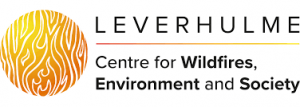The launch of the new Leverhulme Centre was celebrated with a symposium on November the 13th, 2019, at Imperial College London. SPECIAL group members Alexander Kuhn-Regnier, David Kesner, Pablo Paiewonsky, and Sandy Harrison attended the event. They were present as official members of the centre’s management board (Sandy Harrison), to present research (Alexander Kuhn-Regnier) and to learn more about the centre. Alexander presented his research on improving the INFERNO fire model during the poster session. This is research leading up to the development of an improved vegetation parametrisation in the model.
The meeting was mediated by the Centre’s director, Adriana Ford, who introduced the four main speakers at the event and managed the open panel discussion at the end. Topics included the relationship to consumers of the operational information released by the Centre and how they would be more actively involved than in a classical producer–consumer relationship.
The first speaker, Professor Andrew Scott of Royal Holloway, University of London, said that despite various multidisciplinary approaches to understanding wildfire in the Earth system, research efforts have remained disparate across disciplines, which has impeded a needed, integrated approach to understanding and managing fire globally. Increasing catastrophic wildfire events with societal consequences demands collaboration among disparate researchers in physics, ecology, evolutionary theory, modellers, climate scientists, science communicators, economists and the press. The new Centre is specifically focused on bringing together these various fields to move towards a more robust understanding and a more accurate prediction of wildfires that may have important consequences for society and the Earth system as well as informing fire management efforts.
A highlight of the symposium was the presentation by Marc Castellnou, both an experienced firefighter from Catalonia, Spain, and a fire science researcher of the Pau Costa Foundation. He recounted aspects of fire he is practically familiar with, which researchers have yet to capture in their science, including the capacity of large fires to influence local atmospheric properties which, through affecting fire conditions, feeds back to burning characteristics in a matter of hours. The new Centre should be a starting point for moving forward to a deeper understanding of such effects and their implications over the next 10 years.
Professor Sally Archibald of the University of Witwatersrand, South Africa, stressed the importance of non-local researchers in accurately capturing the impacts of human-caused fires on wet season rains, and in understanding that the human effects on fire regimes vary with location and often have a net reducing effect on fire, contrary to popular belief. Professor Colin Prentice of Imperial College London said that the current fire models within global vegetation models are poor overall, and stressed the need for their improvement.


